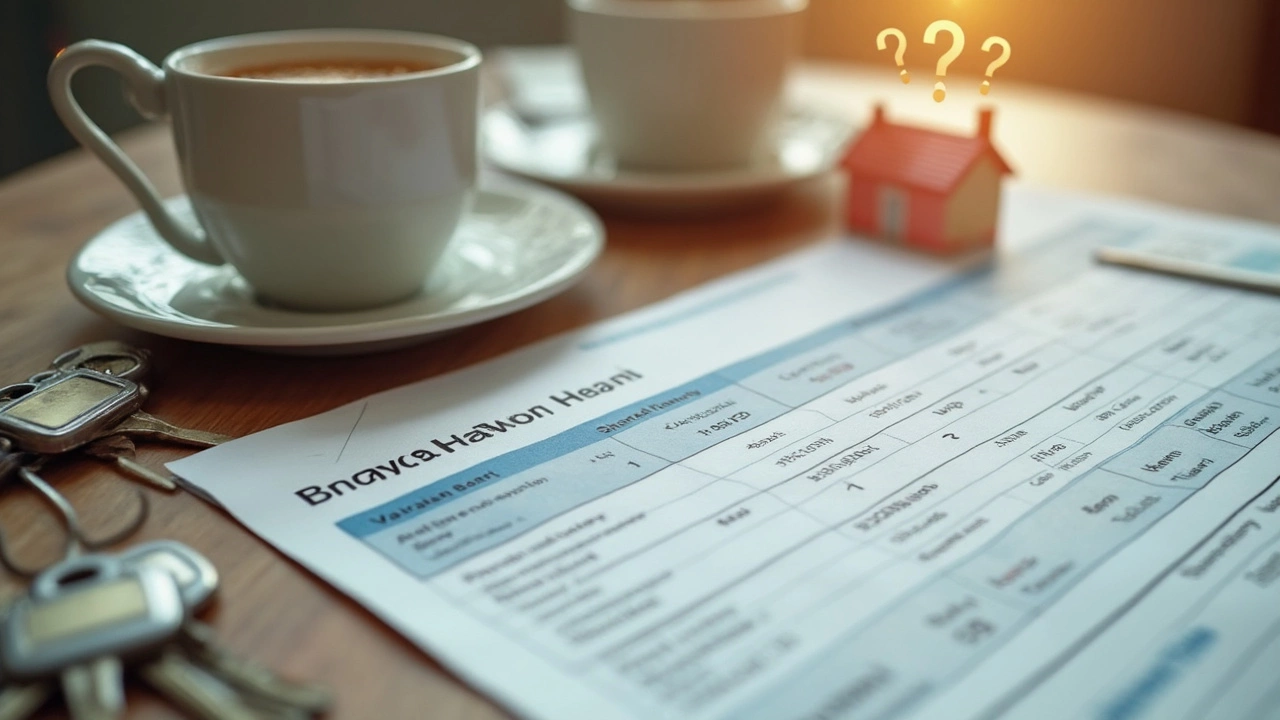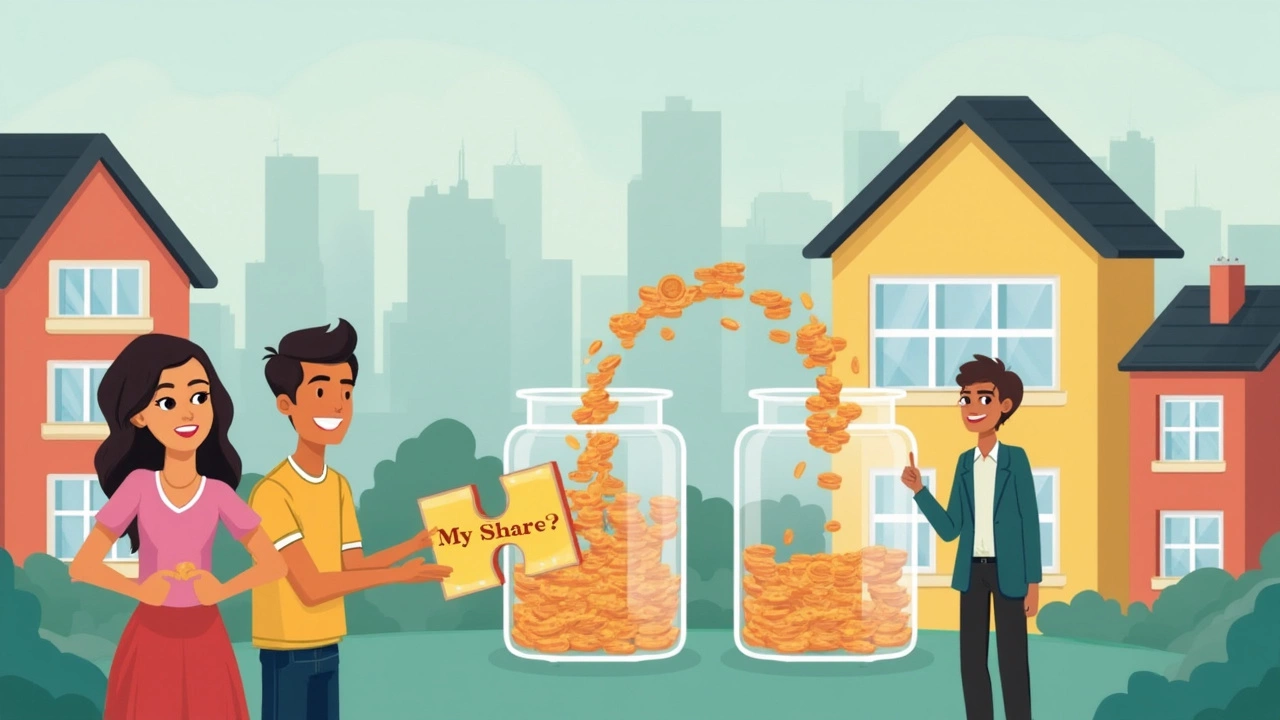If you hear the word 'shareholder,' your mind probably jumps to earning dividends—maybe even getting paid every month like some people do with stocks. But when it comes to shared ownership homes, the setup works a bit differently, and a lot of folks find themselves scratching their heads about how the money actually flows.
Think you've signed up for regular payouts just by owning a chunk of your home? That's the biggest mix-up out there. In shared ownership, the term 'shareholder' has a specific meaning. You own a portion of the property, and you pay rent on the rest—there's usually no monthly paycheck waiting for you. Instead, your money is moving out, not in. It can be a surprise if you're picturing a steady side income just for having your name on part of the deed.
- What Does 'Shareholder' Mean in Shared Ownership?
- How Payments Work in Shared Ownership Homes
- Do Shareholders Receive Monthly Income?
- Common Misconceptions About Shared Ownership Payments
- Tips for Managing Shared Ownership Finances
What Does 'Shareholder' Mean in Shared Ownership?
In the world of shared ownership homes, being called a "shareholder" isn’t quite the same thing as owning shares in a big company like Apple. Here, you’re actually buying a slice of a property—often between 25% and 75%. You live in the home and pay rent on the part you don’t own, which usually belongs to a housing association or developer. So, in plain terms, you’re a part-owner, but you don’t have shares that pay out cash every month.
Here’s how it works: you pay a mortgage on your owned part, and a reduced rent to the organization for the rest. You can increase your share over time, a process called "staircasing." This brings you closer to full ownership, but still, there’s no monthly payout coming your way.
“People often think shared ownership means regular income, but in reality, it’s a way to get on the property ladder when you can’t afford a home outright.” — UK Housing Hub, 2024 Resource Guide
The idea of being a "shareholder" in this setup mostly gives you the right to live in the home and grow your stake. You're not picking up checks—you're paying out, but for many, it's a more affordable step towards owning a home.
| Ownership Share | Mortgage Needed | Rent Paid on Remaining Share |
|---|---|---|
| 25% | Yes (25% value) | 75% share |
| 50% | Yes (50% value) | 50% share |
| 75% | Yes (75% value) | 25% share |
A lot of people assume "shareholder" means cash benefits or voting powers like in a corporation, but here it just means you have part equity and a path to full ownership if that’s your goal. If you were hoping for a monthly payday, this isn’t that kind of deal. The upside is you get to actually live in the thing you own a piece of, not just watch stock numbers on a screen.
How Payments Work in Shared Ownership Homes
Here’s the real deal: with shared ownership homes, you pay for two things every month. First, you cover the mortgage for the share of the home you actually own. Next, you pay rent to the housing association or landlord on the rest—the bit you don’t own yet. Forget pocketing cash for yourself; instead, you’re paying out to keep a roof over your head.
Let’s put numbers on it. Say you own 40% of your home through the scheme. You’ll have a mortgage for that 40%, which you pay to your lender just like any regular home loan. The other 60% is still owned by your landlord or housing association. You pay rent to them on that bit every month.
| Share Owned | Mortgaged To | Who Gets Rent |
|---|---|---|
| 40% | Mortgage Lender | Landlord/Housing Association (on 60%) |
| 60% | Mortgage Lender | Landlord/Housing Association (on 40%) |
The rent is usually cheaper than normal, since you’re only paying it on part of the property, but it still adds up. According to official data in England, the average rent on the part you don’t own is about 2.75% of its value per year. So, if the rented share of your home is worth £120,000, you might pay around £275 a month in rent on top of your mortgage.
Don’t forget service charges, either. These cover things like building maintenance, cleaning shared areas, and insurance. They might sound small, but sometimes they can hit £100 a month or more, especially in buildings with lifts or gardens to look after.
- Pay mortgage monthly on your share
- Pay rent monthly on the landlord’s share
- Cover service charges and maintenance fees
So, even though you technically count as a shareholder of your home, you’re not receiving income from your share like traditional shareholders do. Basically, if you’re in a shared ownership arrangement, ‘payments’ almost always mean money you pay out—not money you’re getting.

Do Shareholders Receive Monthly Income?
Here’s the straight answer: No, people with shared ownership homes don’t get a monthly payout just for being called shareholders. The shareholders keyword really just describes your stake in the property—not a steady stream of money coming in each month, like stock dividends.
Let’s break it down. In shared ownership, you buy a percentage of your home—usually somewhere between 25% and 75%. You pay a mortgage on the bit you own, and rent on the rest (that’s the housing association’s slice). The big thing to know is that you never get paid each month for owning your share. Instead, you’re the one paying out.
Compare that with being a shareholder in a company, where you might get paid dividends—sometimes even every quarter or every month. In shared ownership, the financial flow goes one way: from your pocket, covering both your mortgage and rent.
For example, here’s how monthly costs might look in a real shared ownership setup:
| Payment Type | Typical Monthly Cost (£) |
|---|---|
| Mortgage (40% share) | £450 |
| Rent (60% share owned by association) | £370 |
| Service Charge | £110 |
So instead of money landing in your account, your monthly obligations are pretty clear. If you own 40%, you pay your mortgage on that share, plus rent for the part you don’t own, and chipping in for service charges too.
This setup is great if you want a foot on the property ladder without needing a big mortgage up front. But if it’s monthly dividends or income you’re after, shared ownership homes don’t work that way.
One more thing: if you ever sell your share, you could make money—usually if your home has gone up in value. But while you’re living there, there’s no monthly ‘shareholder’ income. That myth trips up a lot of people who hear the term and think of Wall Street or stocks. With shared ownership, think roots—not returns.
Common Misconceptions About Shared Ownership Payments
This is where confusion ramps up for a lot of people. The first big myth: buying a share of a home means you start getting paid like investors get dividends from company stocks. That doesn’t happen here. In reality, shareholders in shared ownership homes don’t collect income—actually, it’s the opposite. You pay out, usually a mix of mortgage repayments and rent every month, to whoever owns the remaining share, often a housing association.
Another thing some buyers mix up is what ‘rent’ covers. You’re not just paying to live in your share. The rent covers the percentage of the property you don’t own. For example, if you own 40%, you pay rent on the other 60%—no hidden income on your side.
Lots of first-time buyers also miss the extra costs. Besides rent and your mortgage payment, you’ll most likely face monthly service charges, repairs, or maintenance fees. These can catch people off guard if they’re only thinking about the rent. Here’s a quick look at typical monthly outgoings on shared ownership:
| Expense Type | Typical Monthly Cost (£) |
|---|---|
| Mortgage Payment | £400 - £600 |
| Rent to Housing Association | £300 - £500 |
| Service Charge | £50 - £150 |
One last thing that trips people up: some folks think the housing association will share any rise in property value. Not true. You don’t get paid a chunk of increased value until you sell your share, and only then if the property actually appreciates. Monthly payments never turn into monthly income.
- Don’t expect cash-back or income from your share. You pay out, not the other way around.
- Check the fine print on what your rent covers, and always budget for service charges and fees.
- If you want more benefits, you’ll need to increase your ownership share—which means higher mortgage payments, but lower rent as a result.

Tips for Managing Shared Ownership Finances
Keeping your finances in check with shared ownership homes takes real planning—especially since the costs don’t stop at the mortgage. Here’s how you can give yourself a money-savvy edge.
- Know your true monthly outgoings: You’ll usually be covering mortgage payments and rent to the housing association each month. Add in service charges, insurance, repairs, and sometimes ground rent. Don’t forget utility bills, just like in regular home ownership.
- Make a clear budget: Add up every regular cost. Don’t guess—get exact numbers from your provider. Shared ownership isn’t cheap, and surprise bills are the worst.
- Track your payments: Set reminders for your rent and mortgage to avoid missing dates. Late payments can lead to extra fees or—if ignored—risk your right to live there.
- Save for repairs: You’re usually responsible for fixing anything inside your part of the home. Even if you own just 25%, you’ll likely handle all repair costs inside. Plan for at least 1% of your home’s value each year in repairs, like most financial experts suggest.
- Look out for rent hikes: Rents with housing associations can go up yearly, usually by inflation plus up to 1%. Ask for the exact calculation and factor this in for future years.
- Consider staircasing: This means buying bigger chunks of your home over time. The more you own, the lower your rent. Just mind the legal fees and valuation costs—they sometimes catch people off guard.
| Expense Type | Average Monthly Cost (£) |
|---|---|
| Mortgage Payment | £450 |
| Rent to Housing Association | £350 |
| Service Charges | £100 |
| Repairs/Maintenance | £40 |
| Insurance | £15 |
If money’s tight, speak up quickly with your provider. Many housing associations have support teams to help you sort out late payments before things get messy. For bigger changes, check if you can switch to a different mortgage or up your share if your finances improve later on. Remember, with shared ownership you’re balancing rent, a mortgage, and all the usual bills, so every penny counts!
